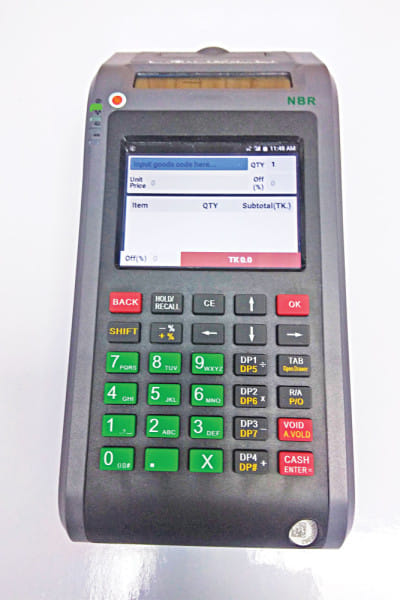Electronic fiscal devices are here -- finally

Electronic fiscal devices (EFDs), the much-talked-about e-cash registers promoted by the revenue authority as a tool to curb tax dodging, finally began to show up at retail stores in cities.
The National Board of Revenue (NBR) yesterday launched the devices to monitor sales at 24 types of retail and wholesale stores to overcome the challenge of collecting the actual amount of value-added tax from tens of thousands of goods and services stores.
"The use of EFDs will bring about a revolutionary change in VAT collection," said NBR Chairman Abu Hena Md Rahmatul Muneem at the inauguration of the EFDs at the NBR headquarters in Dhaka.
Paid by consumers, VAT is the biggest source of revenue and NBR said the number of small and medium retail stores is too high for them to monitor due to a shortage of manpower.
Most of the taxpayers in the category are noncompliant and various complaints are raised from this trade against revenue collectors, NBR said.
Against the backdrop, the EFDs that will be connected to a central server to monitor real-time transaction and store sales data of retails will be instrumental in collecting the actual amount of VAT and curbing evasion, it said.
This will eliminate harassment, reduce the cost of business and increase revenue collection, Muneem said.
The revenue collector said it installed 100 e-sales registers -- 80 in Dhaka and the rest in the port city Chattogram -- on a pilot basis. Later, the pace of installation will increase to bring more stores under the automated system.
NBR aims to install the EFDs at the stores that register more than Tk 50 lakh in turnover annually.
Businesses ranging from hospitality and sweetmeat stores to clothing, furniture and electronics outlets will get the devices free of cost.
By September, 1,000 EFDs will be installed and a total of 100,000 by June next year, said Iqbal Hasan Ferdous, general manager of Synesis IT, a member of the consortium of Shenzhen-based SZZT-KMMT-Synesis-EATL JV that won the contract to supply the devices at Tk 316 crore to the NBR last fiscal year.
NBR had decided to set up the EFDs and sales data controllers three years ago after its previous bid to enforce the use of electronic cash registers failed mainly because of the absence of any electronic server to monitor transactions at shops.
There was no scope to capture real-time transactions and there was no tool for auto-monitoring, NBR said.
With the use of the EFDs, every transaction that would take place at the stores will be done through verification with the server at the revenue board.
The digital devices will also be helpful for businesses as they will be able to keep proper accounts of their sales and inventory of goods, NBR said.
"It will bring transparency. A buyer will clearly understand whether the VAT he or she has paid is deposited to the state coffer," Muneem said.
Buyers will be able to confirm the deposit of the tax by scanning the receipt. Besides, NBR will keep information of buyers in its server and hold lottery time to time to encourage consumers to ask for receipts of purchases.
NBR said it completed the preparations and had planned to inaugurate the e-devices on the occasion of the birth centenary of the Father of the Nation Bangabandhu Sheikh Mujibur Rahman.
But it had to postpone the plan due to the outbreak of coronavirus and subsequent shutdown aimed at taming the deadly pathogen.
NBR decided to start installing the digital devices as the economy reopened and businesses restarted since the government-enforced lockdown was lifted by the end of May.
Revenue collection from retail trade will increase significantly because of the use of the electronic devices, Muneem said. "The real benefit will come when the whole country will be under the EFD network," he added.
The consortium was asked to supply 10,000 EFDs initially.

 For all latest news, follow The Daily Star's Google News channel.
For all latest news, follow The Daily Star's Google News channel. 



Comments